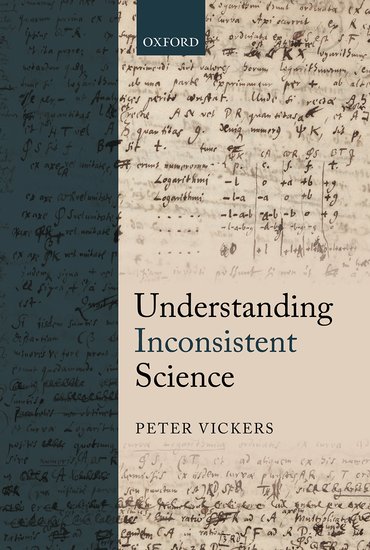By Peter Vickers
An important part of life is judging when to be sceptical about scientific claims, and when to trust in those claims and take actions accordingly. Often this comes down to the task of weighing up evidence. But we might think that when the science in question is internally inconsistent, or self-contradictory, we have an easy decision. In such circumstances the science contravenes one of our most basic conditions on useful, or trustworthy, information. As Karl Popper put it in 1940, “If one were to accept contradictions, then one would have to give up any kind of scientific activity: it would mean a complete breakdown of science.”
It comes as a surprise, then, to learn that the history of physics is littered with (a) inconsistencies going unnoticed for 10s, or even 100s, of years, (b) inconsistencies which are noticed but which are tolerated, and (c) scientific concepts which seem to be self-contradictory. We find all of these things not in the dark corners of science, but instead in some of the most prominent theories, and put forward by ‘great scientific minds’. If we really want to be able to judge the trustworthiness of scientific claims, it turns out Popper’s method of ruling out all inconsistencies is far too crude. Inconsistency and science often can go hand in hand.

The answer is ‘yes and no’. Sometimes truth drives scientists, but often they are more than happy to solve some outstanding problem, or make a useful prediction. Often, the word ‘truth’ is left out of science completely – left for the philosophers to think out. The early calculus is a prime example of how a certain inconsistency in one’s thinking is neither here nor there if one is ‘getting results’. The eminent Swiss mathematician Johann Bernoulli was one of the great mathematical minds of his age, and yet in an important essay written in 1691 he stated: “A quantity, which is diminished or increased by an infinitely small quantity, is neither diminished nor increased.” For most of his contemporaries (especially Bishop George Berkeley!), this sort of thinking was plain contradiction, or at least ‘incomprehensible metaphysics’. Nonetheless, Bernoulli and others found an appeal to ‘infinitely small quantities’ extremely useful for solving mathematical problems which had eluded the best minds for centuries. As Heaviside would recommend, he had found a way to ‘get on’, and was ‘leaving the logic for later work’.

But how can one trust Bernoulli’s ‘results’ in these circumstances? If one starts with something ‘absurd’, doesn’t that suggest that one’s conclusions will also be absurd, or at least definitely false? Actual scientific practice flies in the face of this concern. In general, in science – and especially physics – it is common practice to adjust one’s hypotheses so as to make the reasoning easier. These ‘adjustments’ usually involve moving from an assumption that has a chance of being true, to an assumption one knows, or believes, to be false. In such circumstances one can end up reasoning with an inconsistent set of assumptions, strictly speaking, since one combines things one believes to be true with things one believes to be false. Now it is well known that if one starts with an inconsistency one can, logically speaking, derive any result one wants. But in recent decades there has been increasing appreciation that scientific reasoning both is, and should be, something rather different from simple logical deduction. As Paul Feyerabend already put it in 1978: “The objection that a contradiction entails every statement applies to special systems of logic, not to science which handles contradictions in a less simpleminded fashion.”
A nice example to bring this to life is Gustav Kirchhoff’s theory of the diffraction of light at an aperture – a case that has puzzled scientists for more than a century. In his reasoning Kirchhoff made an assumption concerning the behaviour of incident light within the aperture of a plane screen. But Kirchhoff’s conclusions contradict this very assumption! How then can this be useful, or trustworthy, science? The truth is, Kirchhoff’s conclusions are extremely accurate and useful in a great many respects; so long as one is careful about the ‘respects’, one can trust the predictions. And this needn’t be surprising, since Kirchhoff’s starting assumptions, despite being somehow inconsistent, are also largely approximately true. The final lesson is this: if one starts with false assumptions one can no doubt reach false conclusions. But often one can also reach useful, or even true conclusions. It all depends on how one goes about using them.
Peter Vickers completed his undergraduate BSc in Mathematics and Philosophy at the University of York in 2003. This was followed by an MA in History and Philosophy of Science at the University of Leeds, completed in 2005, and a PhD in the history and philosophy of science, also at the University of Leeds in 2009. Following a year teaching at Leeds, Vickers spent a year as a Postdoctoral Fellow at the Center for Philosophy of Science at the University of Pittsburgh, before returning to the UK in 2011 as a Lecturer in Philosophy at Durham University. He is the author of Understanding Inconsistent Science.
Subscribe to the OUPblog via email or RSS.
Subscribe to only philosophy articles on the OUPblog via email or RSS.
Image credits: (1) Karl Popper in the 1980s. By LSELibrary [no known copyright restrictions], via Wikimedia Commons; (2) Supplied by the author.



[…] Over on OUP's blog, Peter Vickers (Durham) argues that inconsistency and science go hand in hand. […]